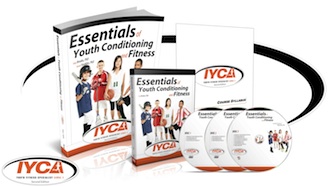By Dave Gleason, IYCA Director of Youth Fitness
Coaches and trainers love working with team sport athletes live to get after it in their training sessions. You know the type: you give them a cue to correct an exercise or activity and bam…they listen, they absorb, and they transfer that information into a more efficient movement. The type of internally-inspired young athlete that gives everything they have for each training session is a dream come true—right?
What are the odds of coaching these types of younger athletes 100% of the time?
What is the mark of a great coach?
How do we handle the athlete who is not quite as motivated? Moreover, how are we to coach the reserved or shy athlete that is seemingly unenthusiastic?
This short article is based on experiential evidence from coaching young athletes for the past 22 years as well as the tenants in found in the IYCA Essentials of Youth Conditioning and Fitness text and is meant to help free any coach…from themselves.
Meet them where they are.
The reserved athlete does not wake up in the morning yearning to have you infuse inspiration into their heart, mind, and soul at 4 pm. The reserved athlete wants to have as much fun as any of the athletes you coach. That fun is contextual. Fun for one may not be as much fun for another.
How do they roll? Not all kids want you to shout their names from the rooftops. Connect with your athletes as much as possible to learn what is important to them and to ascertain where they are.
Love them without losing yourself.
The young athletes you coach will loosely fall into one of the following four categories:
- High skill, high motivation
- High skill, low motivation
- Low skill, high motivation
- Low skill, low motivation
We will focus on high skill, low motivation and low skill, low motivation young athletes in an effort to give insight on the art of coaching these children.
A high skill, low motivation young athlete can be frustrating due to the stigma of just “not reaching his or her potential.” The primary goal is to inspire this athlete. The coach should be extremely cognitive that there are a multitude of reasons as to the source of the low motivation. Be extremely sensitive that this athlete may in fact be giving all he or she has to give. Sometimes this child simply needs someone to believe in them. Short-term goal setting, even if the goal falls far below what most would deem competitive is a common strategy that has also worked extremely well.
Low skill, low motivation athletes are in need of direction. These young athletes will need to be included in activities, discussions and sharing of concepts, activity creation, and coordination of your programming just as much as—if not more than—the other athletes in your groups. Typically, these athletes do not respond well to being the center of attention, or once more, being called out in front of others. A successful approach may be one-on-one conversations and communication.
If you want more information on the temperaments of young athletes, our Youth Fitness Specialist Certification is a comprehensive resource that will enable you to coach your athletes to success.
The IYCA Youth Fitness Specialist – Level 1
12 IYCA CEUs
The Foundation for a Successful Career in Youth Training
- 220 page textbook authored by Dr. Toby Brooks and Dr. David Stodden with contributions from Dave Gleason, Wil Fleming, Kim McCullough and Mike Robertson
- 2 DVD set with narrated screencasts
- Online examination process so you can complete your certification from the comfort of your own home
Click Here to Learn More About the Youth Fitness Specialist Level 1 Certification
Utilize outcome-based coaching.
The foundation for coaching both of these reserved athletes must be outcome-based coaching. Skill acquisition via as little cueing as possible will allow for neural blueprinting and learning at a faster rate. Goal confusion and frustration will only lead to a more reserved athlete. An athlete who feels successful will be more apt to become excited as they take ownership over their own physical culture and fitness.
Therefore, be keen to recognize that if a young athlete completes a task, exercise, or activity through their interpretation of your direction(s)…praise them in an appropriate way to that athlete. If the outcome is not what you imagined or hoped for, do not be quick to believe the athlete did not have success. Reflectively coaching the situation will allow you to determine in your communication was not clear or if the activity needs a regression in to produce success.
It is my hope that this helps you coach the reserved athlete that is on your team, program or client roster.
Keep changing lives!
For more information on the “Art of Coaching” the reserved athlete- check out our #1 Certification, The IYCA Youth Fitness Specialist Level 1 Be the Game-Changer in Youth Fitness and Sport Performance!
The IYCA Youth Fitness Specialist – Level 1
12 IYCA CEUs
The Foundation for a Successful Career in Youth Training
- 220 page textbook authored by Dr. Toby Brooks and Dr. David Stodden with contributions from Dave Gleason, Wil Fleming, Kim McCullough and Mike Robertson
- 2 DVD set with narrated screencasts
- Online examination process so you can complete your certification from the comfort of your own home
Click Here to Learn More About the Youth Fitness Specialist Level 1 Certification


